
Viva Villa! is a 1934 American pre-Code film directed by Jack Conway and starring Wallace Beery as Mexican revolutionary Pancho Villa. The screenplay was written by Ben Hecht, adapted from the 1933 book Viva Villa! by Edgecumb Pinchon and O. B. Stade. The film was shot on location in Mexico and produced by David O. Selznick. There was uncredited assistance with the script by Howard Hawks, James Kevin McGuinness, and Howard Emmett Rogers. Hawks and William A. Wellman were also uncredited directors on the film.

Love Affair is a 1939 American romantic film, co-starring Charles Boyer and Irene Dunne, and featuring Maria Ouspenskaya. It was directed by Leo McCarey and written by Delmer Daves and Donald Ogden Stewart, based on a story by McCarey and Mildred Cram. Controversial on concept, the official screenplay was re-tooled and rewritten to appease Hollywood censorship and relied on actor input and improvisation, causing long delays and budget extensions.

The Motion Picture Production Code was a set of industry guidelines for the self-censorship of content that was applied to most motion pictures released by major studios in the United States from 1934 to 1968. It is also popularly known as the Hays Code, after Will H. Hays, president of the Motion Picture Producers and Distributors of America (MPPDA) from 1922 to 1945. Under Hays's leadership, the MPPDA, later the Motion Picture Association of America (MPAA) and the Motion Picture Association (MPA), adopted the Production Code in 1930 and began rigidly enforcing it in 1934. The Production Code spelled out acceptable and unacceptable content for motion pictures produced for a public audience in the United States.

Joseph Schildkraut was an Austrian-American actor. He won an Oscar for his performance as Captain Alfred Dreyfus in the film The Life of Emile Zola (1937); later, he was nominated for a Golden Globe for his performance as Otto Frank in the film The Diary of Anne Frank (1959) and a Primetime Emmy for his performance as Rabbi Gottlieb in a 1962 episode of the television series Sam Benedict.
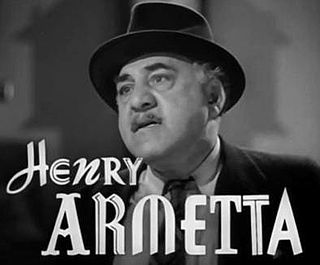
Henry Armetta was an American character actor who appeared in at least 150 American films, beginning in silent movies. His last film was released posthumously in 1946, the year after his death.

Bobby Vernon was an American comedic actor in silent films. He later became a writer and comedy supervisor at Paramount for W. C. Fields and Bing Crosby, when the sound era arrived. Blue-eyed with medium brown hair, he stood five feet and two-and-a-half inches, making him perfect for juvenile comedy roles. His comedies were popular with children.
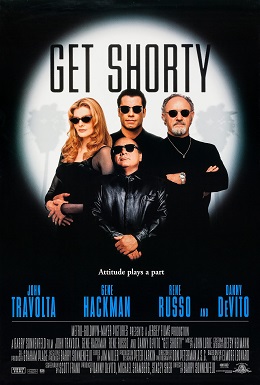
Get Shorty is a 1995 American gangster comedy film directed by Barry Sonnenfeld and written by Scott Frank, based on Elmore Leonard's novel of the same name. The film stars John Travolta, Gene Hackman, Rene Russo, Delroy Lindo, James Gandolfini, Dennis Farina, and Danny DeVito. It follows Chili Palmer (Travolta), a Miami mobster and loan shark who inadvertently gets involved in Hollywood feature film production.

Isadore Borsuk, better known as Bobby Breen, was a Canadian-born American actor and singer. He was a popular male child singer during the 1930s and reached major popularity with film and radio appearances.
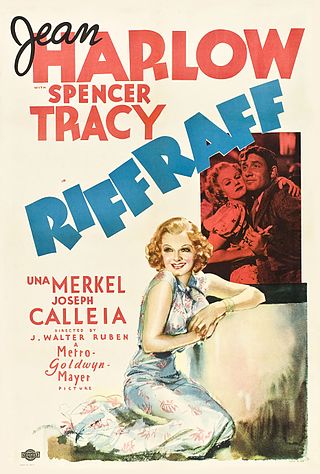
Riffraff is a 1936 American drama film directed by J. Walter Ruben and starring Jean Harlow, Spencer Tracy and Una Merkel. The screenplay was written by Frances Marion, Anita Loos and H. W. Hannaford.
Joseph Ignatius Breen was an American film censor with the Motion Picture Producers and Distributors of America who applied the Hays Code to film production.

Robert Ferris Taylor was an American film actor and vaudeville performer.

Manuel Granada was an Argentine actor who appeared in American, Spanish, Argentine and Mexican films. For the first half of his career, he worked under the names Paul Ellis and Manuel Granado.

A Dog of Flanders is a 1935 American drama film directed by Edward Sloman, based on a screenplay by Ainsworth Morgan from the story by Dorothy Yost, which she adapted from the 1872 novel of the same name by Ouida. The film stars Frankie Thomas, appearing in only his second film.
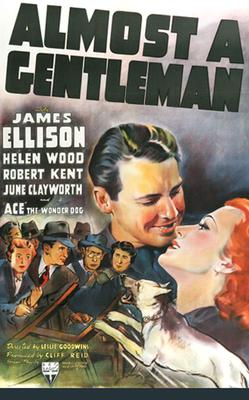
Almost a Gentleman is a 1939 American drama film directed by Leslie Goodwins from a screenplay by David Silverstein and Jo Pagano, based on the story by Harold Shumate. The film stars James Ellison, Helen Wood and Robert Kent. It was released by RKO Radio Pictures on March 31, 1939.
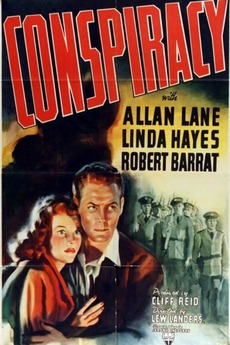
Conspiracy is a 1939 American spy drama film directed by Lew Landers, from a screenplay by Jerome Chodorov, based on the story, "Salute to Hate", by John McCarthy and Faith Thomas. The film stars Allan Lane, Linda Hayes, and Robert Barrat, and was produced and distributed by RKO Radio Pictures, who premiered the film in New York City on August 23, 1939, with a general release on September 1.
Maury Cohen, also known as Maury M. Cohen, was an American film producer most active during the 1930s. He owned one of the Poverty Row studios, Invincible films, which specialized in making low-budget feature films. After leaving film in the early 1940s, Cohen founded and ran the historic dance club in Los Angeles, the Hollywood Palladium.
Lionel Royce was an Austrian-American actor of stage and screen, also known during his European career as Leo Reuss. He began his career in theater in Vienna, Austria, in 1919, before moving to Berlin in 1925. Being Jewish, his work began to be restricted in the 1930s in Nazi Germany. Fleeing the Nazis he returned to Austria in 1936, where to hide his heritage, he created the persona of Kaspar Brandhofer, a Tyrolian peasant, and became a sensation as a natural actor on the stage in Vienna. When he admitted his ruse, he became blacklisted in Austria, after which he emigrated to the United States in 1937. He had an active film career in the United States, appearing in almost 40 films between 1938 and 1946. While on tour with the USO, he died in Manila in 1946.
William Stack was an American actor who began his acting career in Great Britain. Over the course of his career he appeared in over 50 films in the U.S. and the U.K, including such notable films as Mary of Scotland, Captains Courageous, and Gone with the Wind.
Lee Marcus, also known as Lee S. Marcus, was an American film producer of the 1930s and 1940s. During his fifteen-year career he produced over 85 films, most of them between 1934 and 1941 while he was at RKO Studios. Prior to his production career, Marcus worked for FBO and then RKO as a sales executive, reaching the level of vice president in both organizations. At RKO, he was head of production of the studio's b-films during the late 1930s and the beginning of the 1940s. He was also responsible for producing what many consider to be the first film noir, 1940's Stranger on the Third Floor.
Irene Dare was a young American figure skater and film star. In the late 1930s, she was described as "a small edition of Sonja Henie" and "closer to being 'another Shirley Temple' than anybody in recent years."














